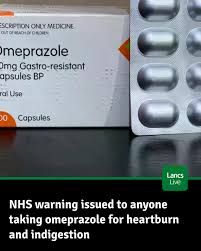
Introduction
The National Health Service (NHS) recently issued a caution regarding the long-term use of omeprazole, a well-known proton pump inhibitor (PPI) commonly used to treat conditions like acid reflux and peptic ulcers. This warning comes in light of new evidence suggesting potential risks associated with prolonged consumption of the medication, which could have significant implications for millions of patients across the UK.
Details of the NHS Warning
The NHS guidance highlights concerns that long-term use of omeprazole and other PPIs may lead to increased risks of kidney disease, gastrointestinal infections, and certain deficiencies, including magnesium and vitamin B12. The warning is based on data from recent studies that indicate potential health issues linked to extended use beyond what is medically necessary.
As part of their recommendations, the NHS urges healthcare professionals to evaluate the necessity of ongoing omeprazole treatment after a patient has been on the medication for an extended time. The goal is to explore alternative treatments or to consider tapering off, if appropriate. The NHS stresses that while omeprazole is effective for short-term management of acid-related disorders, patients should be properly evaluated for continued use.
Patient Impact
The implications of this warning may significantly affect those managing chronic conditions requiring long-term medication. Patients are advised to consult their healthcare providers before making any changes to their medication regimen. Health professionals are encouraged to provide guidance on the safest and most effective treatment pathways to minimise potential risks while ensuring the management of underlying conditions remains effective.
Conclusion
In light of the NHS warning, the healthcare community faces a critical moment. This guidance not only emphasizes the importance of regular reviews of medication appropriateness but also serves as a timely reminder for patients to actively engage in discussions about their treatments with their GP or pharmacist. As ongoing research continues to evolve, the NHS remains committed to providing updated guidance to ensure patient safety and effective healthcare delivery. Stakeholders, including patients and healthcare providers, must remain vigilant and informed about the risks concerning medications like omeprazole, ensuring that those who need treatment are able to receive it safely.
You may also like

Understanding the Current Measles Outbreaks

Understanding Omeprazole: Benefits and Considerations
